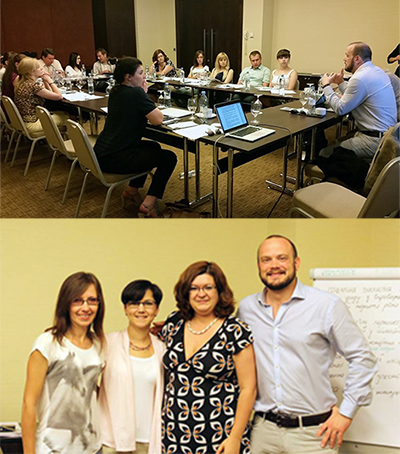Angela Martin, LMSW from Wayne State University's Developmental Disabilities Institute Works with Disability Rights International in Ukraine (MI UCEDD)
August 31, 2015

|
In July 2015 Angela Martin, LMSW from the Developmental Disabilities Institute at Wayne State University was invited by Disability Rights International (DRI) to travel to Ukraine and prepare individuals with disabilities, family members, and service providers to advocate for community-based, person-centered supports. DRI is working to organize individuals with disabilities and family members following its three-year long examination of the inhumane conditions that children with disabilities experience in Ukraine's orphanages.
In recent years, Ukrainian citizens have been faced with the devastating effects from war, political uproar, and an economic downfall. This is the reality for many citizens in the Ukraine. For Ukrainian citizens with disabilities their reality consists of a much worse fate through physical and social isolation in the country's various forms of institutions. The orphanages, psychiatric facilities, boarding schools, or social care centers are not just places of residences to Ukrainian children and adults with disabilities, they also house children from low socio-economic backgrounds whose parents struggled to provide for them. Despite the family's desperate aspirations of giving their children a better life, Ukraine's facilities are increasingly susceptible to abuse and exploitation.
Disability Rights International's report entitled, No Way Home: The Exploitation and Abuse of Children in Ukraine's Orphanages, exposed the various exploitations occurring in Ukrainian orphanages as well as various other discrepancies on the actual number of children housed in the various facilities. This report was released in April 2015. Since that time, DRI has been working diligently to encourage local, federal, and international resources to make investments in community-based supports and eliminate the use of segregated, congregate supports. Despite the progressive steps Ukraine is currently taking to rebuild their nation's governmental and economic structures, Ukraine does not have current plans to close its various orphanages or institutions and reinvest those resources into community-based supports.
Martin traveled with DRI's Associate Director, Eric Mathews, to Kyiv and Kharkiv, Ukraine. In Kharkiv, DRI hosted a two-day meeting to share information about its report and prepare local leaders (individuals with disabilities, family members, local advocates and service providers) to advocate for quality, community-based supports. The first day was a training for parents and family members to learn about the UN Convention of Rights of People with Disabilities, the history of the disability rights movement in the US, and impact of person-centered supports and family-centered, community-based supports. The second day gathered leading disability advocates and service providers to strategize and organize advocacy efforts for high quality disability services and the elimination of institutional supports. Martin shared the experience of how Michigan successfully transitioned its services from segregated, institutional supports to community-based, person-directed and family centered services and supports.
Following the two-day meeting in Kharkiv, Martin participated in DRI's meeting with Ukraine's Ombudsman for Children. DRI presented its report findings and offered its assistance with transitioning from institutions to community supports. Martin shared information on services in the US and Michigan that are currently successfully supporting individuals with disabilities to live meaningful lives in the community.
To read Disability Rights International's report: No Way Home: The Exploitation and Abuse of Children in Ukraine's Orphanages, please visit: http://www.driadvocacy.org/media-gallery/our-reports-publications/







